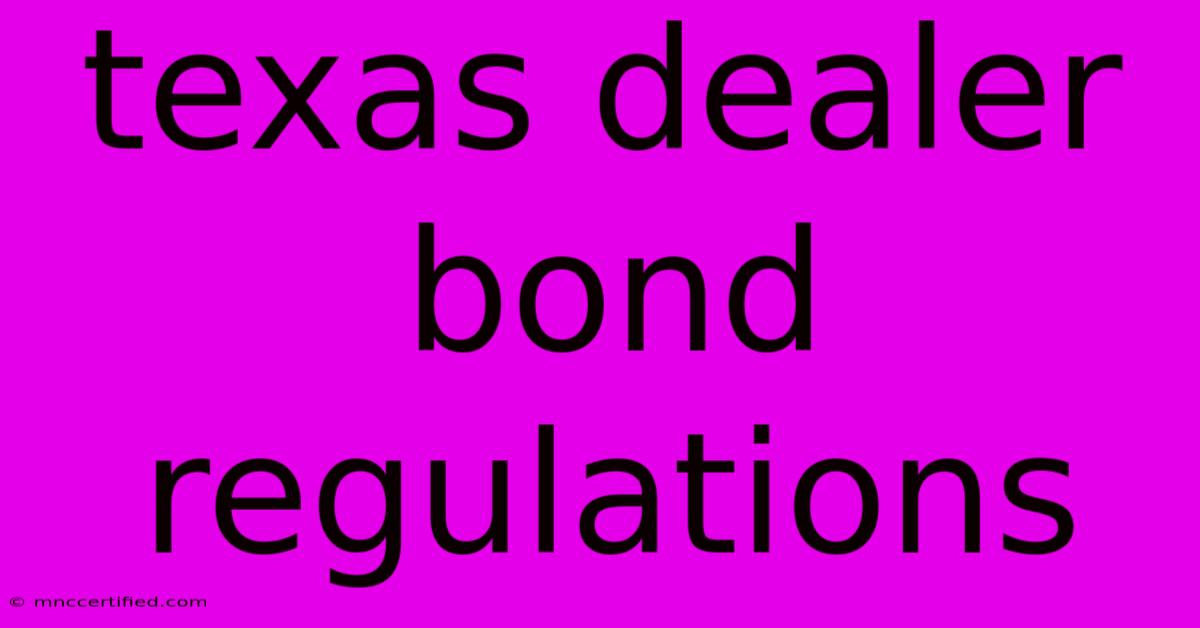Texas Dealer Bond Regulations

Table of Contents
Texas Dealer Bond Regulations: A Comprehensive Guide for Auto Dealers
Navigating the complexities of Texas dealer bond regulations can be daunting. This comprehensive guide breaks down the requirements, ensuring you understand your obligations and avoid costly mistakes. Whether you're a new dealer or an experienced one looking for a refresher, this information is crucial for compliance and maintaining a successful business.
Understanding the Texas Motor Vehicle Dealer Bond
In Texas, a surety bond—often called a dealer bond—is a mandatory requirement for all motor vehicle dealers. This isn't insurance; it's a financial guarantee protecting consumers from fraudulent or unethical practices. The bond assures the state that you will operate legally and ethically. Failure to maintain a valid bond can result in significant penalties, including the revocation of your license.
Key Aspects of the Texas Dealer Bond:
- Amount: The required bond amount varies depending on the type of dealership and location. You'll need to check the specific requirements with the Texas Department of Motor Vehicles (TxDMV). Generally, expect a substantial sum, potentially ranging from several thousand to tens of thousands of dollars.
- Surety Company: You obtain the bond from a licensed surety company, not an insurance provider. These companies assess your risk and determine the premium you'll pay. Shop around for competitive rates.
- Renewal: Texas dealer bonds typically require annual renewal. Failing to renew on time leads to immediate license suspension. Set reminders well in advance.
- Claims: If a customer files a valid claim against you, the surety company will pay up to the bond amount. This protects consumers from financial losses due to your actions. You'll then be responsible for reimbursing the surety company. Maintaining a clean operating record significantly reduces the risk of claims.
Types of Dealerships and Bond Requirements
Texas categorizes motor vehicle dealerships differently, each with specific bonding requirements:
- Franchise Dealers: These dealerships represent a specific manufacturer (e.g., Ford, Toyota). Their bonding requirements are typically higher due to the larger scale of their operations.
- Independent Dealers: These dealerships sell vehicles from various manufacturers. Their bonding requirements might differ depending on their sales volume and inventory.
- Wholesale Dealers: These dealers primarily sell vehicles to other dealers, not directly to the public. They still require a bond, though the amount might vary.
Always verify the precise bonding requirements based on your specific dealership type and location with the TxDMV.
Consequences of Non-Compliance
Operating without a valid dealer bond or violating other regulations can lead to severe penalties:
- License Suspension or Revocation: This is the most immediate and serious consequence. You will be unable to legally sell vehicles.
- Fines: Significant monetary penalties can be levied for non-compliance.
- Legal Action: Consumers can sue you directly for damages if you violate the law. The bond is designed to protect them, but your personal assets might also be at risk.
- Reputation Damage: News of regulatory violations can severely damage your reputation and make it difficult to operate in the future.
Finding a Surety Bond and Maintaining Compliance
Obtaining a surety bond requires careful planning and preparation:
- Credit Check: Surety companies conduct thorough credit checks. A good credit score significantly improves your chances of approval and obtaining a favorable premium rate.
- Application Process: Complete the application accurately and thoroughly. Inaccurate information will delay the process and may lead to rejection.
- Premium Payment: Expect to pay an annual premium to maintain the bond. The premium is a percentage of the bond amount, determined by the surety company's assessment of your risk.
- Ongoing Compliance: Regularly review your compliance with all Texas motor vehicle dealer regulations to avoid future problems.
Conclusion: Proactive Compliance is Key
Understanding and adhering to Texas dealer bond regulations is not merely a legal obligation; it's a crucial aspect of establishing and maintaining a reputable and successful automotive dealership. Proactive compliance, diligent record-keeping, and a commitment to ethical business practices will protect your business, your customers, and your future. Always consult the official Texas Department of Motor Vehicles website for the most up-to-date information and requirements.
Keywords: Texas dealer bond, Texas motor vehicle dealer bond, auto dealer bond Texas, dealer bond regulations Texas, surety bond Texas, TxDMV dealer bond, Texas DMV dealer requirements, auto dealer license Texas, Texas car dealer bond, motor vehicle dealer bond Texas, compliance Texas auto dealer
Off-Page SEO Strategies:
- Build high-quality backlinks from relevant websites in the automotive industry, legal field, and business resources.
- Engage in online forums and communities related to Texas auto dealerships.
- Create informative content on other relevant topics related to auto dealerships in Texas.
- List your business in relevant online directories.
This comprehensive guide aims to help Texas auto dealers navigate the complex world of dealer bond regulations. Remember that this information is for guidance only and should not be considered legal advice. Always consult with legal and financial professionals for specific guidance related to your individual situation.

Thank you for visiting our website wich cover about Texas Dealer Bond Regulations. We hope the information provided has been useful to you. Feel free to contact us if you have any questions or need further assistance. See you next time and dont miss to bookmark.
Featured Posts
-
High Ticket Prices Anger Lana Del Rey Fans
Nov 28, 2024
-
Stellantis Closes Vauxhall Luton Plant
Nov 28, 2024
-
What Does Unsecured Bond Mean
Nov 28, 2024
-
Euromillions Ticket Check Numbers Error
Nov 28, 2024
-
Spotify App Update Wrapped Ready
Nov 28, 2024